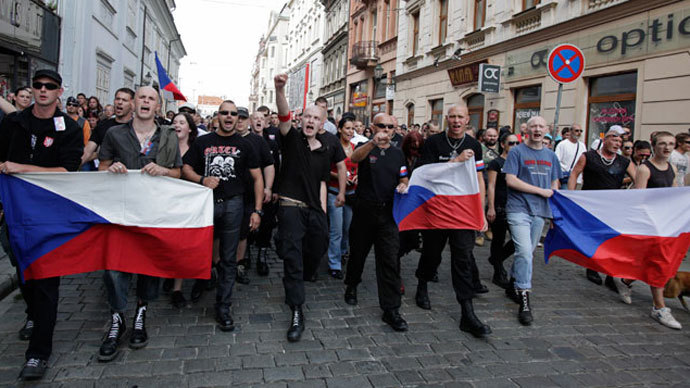Winner
Diverse in Unity
It is one of those self-perpetuating vicious-circle problems which are very hard to deal with for any country, including the most advanced ones in terms of multicultural outlook and economic resources available.
In the Czech Rep. specifically, you have two mutually supporting forces at play: 1) the unwillingness of many in the Roma(ni?) community to adapt to and accommodate the majority culture; 2) the resulting dislike and prejudices among the majority population.
General attitude towards the Roma(ni?) ranges from scepticism (at best) to overt racism (at worst). Against that you have a vocal alliance of public intellectuals, NGOs and human rights activists who are trying to re-shape the public perception of the Roma(ni?). Recently I was doing some translation work for the Museum of Romani Culture here in Brno (which is a pretty rare institution of this kind in Europe); people who work there are hard at work trying to bridge the gap between the Roma(ni?) and the majority, but they constantly encounter problems on both sides of the issue.
As an individual, I have my share of pretty negative experiences with Roma(ni?) individuals. As a college-educated person I am trying to separate those from my intellectual understanding of the issue.
Concerning far-right groups, the Roma(ni?) issue is the greatest tool at their disposal. In general, Czechs are not xenophobic people. If you tried to get them to support your fringe neo-Nazi group by railing against the Vietnamese, Ukrainians, Slovaks, Poles, Germans, Jews or the other minorities, you'd be ignored into oblivion. They gain some support chiefly in areas where there is a lot of tension between Roma(ni?) inhabitants and the rest, i.e. north-west Bohemia and north Moravia where Roma(ni?)-inhabited slums have developed in the post-industrial wasteland left over from the Communist era. The locals feel the authorities are not addressing their security/welfare needs and as a result they tend to join with the far-right groups in a sort of protest hoping to wake the authorities up and make the problem register on the government's radar.
In the Czech Rep. specifically, you have two mutually supporting forces at play: 1) the unwillingness of many in the Roma(ni?) community to adapt to and accommodate the majority culture; 2) the resulting dislike and prejudices among the majority population.
General attitude towards the Roma(ni?) ranges from scepticism (at best) to overt racism (at worst). Against that you have a vocal alliance of public intellectuals, NGOs and human rights activists who are trying to re-shape the public perception of the Roma(ni?). Recently I was doing some translation work for the Museum of Romani Culture here in Brno (which is a pretty rare institution of this kind in Europe); people who work there are hard at work trying to bridge the gap between the Roma(ni?) and the majority, but they constantly encounter problems on both sides of the issue.
As an individual, I have my share of pretty negative experiences with Roma(ni?) individuals. As a college-educated person I am trying to separate those from my intellectual understanding of the issue.
Concerning far-right groups, the Roma(ni?) issue is the greatest tool at their disposal. In general, Czechs are not xenophobic people. If you tried to get them to support your fringe neo-Nazi group by railing against the Vietnamese, Ukrainians, Slovaks, Poles, Germans, Jews or the other minorities, you'd be ignored into oblivion. They gain some support chiefly in areas where there is a lot of tension between Roma(ni?) inhabitants and the rest, i.e. north-west Bohemia and north Moravia where Roma(ni?)-inhabited slums have developed in the post-industrial wasteland left over from the Communist era. The locals feel the authorities are not addressing their security/welfare needs and as a result they tend to join with the far-right groups in a sort of protest hoping to wake the authorities up and make the problem register on the government's radar.




